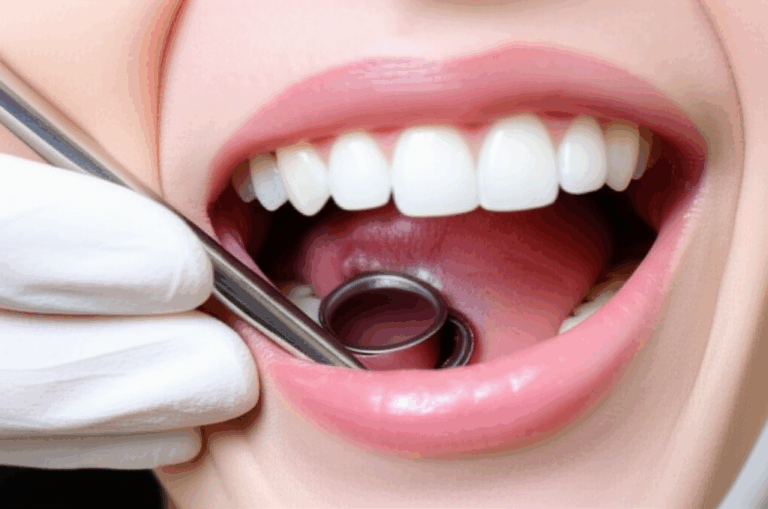
Can a Dentist Diagnose Sjogren’s Syndrome? Understanding Their Critical Role in Early Detection
Table of Contents
- Persistent Dry Mouth (Xerostomia)
- Increased Dental Caries and Erosion
- Oral Candidiasis (Thrush)
- Salivary Gland Swelling
- Other Oral Manifestations
- Patient History Clues
Introduction: The Dentist’s Unique Position in Sjogren’s Detection
When I first heard about Sjogren’s syndrome, I didn’t really think of dentists being part of the story. Like most people, I thought doctors and specialists took care of these kinds of sicknesses. But now, after seeing how dentists and doctors work together, I see that dentists actually have a big part, especially because this illness often shows up in the mouth first.
Let me be clear. Dentists can’t officially tell you that you have Sjogren’s syndrome. You need special tests and a visit with a rheumatologist for that. Still, dentists play a huge part in noticing the signs and making sure you get pointed in the right direction. If you’re wondering how your dentist could help with your Sjogren’s diagnosis—or if you just have a dry mouth all the time and don’t know why—this article is for you. I’m going to share what I’ve learned, the things dentists look for, and why talking with your dentist really can matter.
The Dentist’s Essential Role: Recognizing Oral Signs of Sjogren’s
I like to say dentists have a special gift for spotting small health problems early. Unlike your family doctor, your dentist looks at your mouth up close—and many times, your mouth is where Sjogren’s first shows up.
Patients usually go to the dentist more often than they see their main doctor, sometimes twice a year or more. This means dentists are in just the right spot to catch early signs like dry mouth or extra cavities before anyone else does. Sometimes, I’ve seen a patient’s whole diagnosis start because they say, during a regular cleaning: “My mouth is always dry, no matter how much I drink.” That simple sentence can start someone on the road to finally figuring out what’s been wrong.
Catching Sjogren’s early helps people stay healthy. It can stop bigger problems down the road—like losing teeth or starting to have problems with organs. When a dentist sees the signs and sends you to get checked, they’re helping as your first line of defense.
Key Oral Symptoms and Findings a Dentist Observes
When I look back at my patients who found out they had Sjogren’s, there are a few mouth issues I saw over and over again. These aren’t just random things—they happen together, and that can raise a dentist’s concern and help guide what to do next.
Persistent Dry Mouth (Xerostomia)
Dry mouth is one of the biggest signs of Sjogren’s. I see dry mouth for lots of reasons, like medicines or not drinking enough water. But if the dryness is really bad and just won’t go away, that’s a sign we need to look more closely. Dry mouth from Sjogren’s isn’t just annoying. It can come with:
- Sticky or dry-feeling mouth and tongue, even after drinking water.
- Trouble talking or swallowing.
- Not much spit building up under the tongue.
- Always needing to sip water, even when in bed at night.
If a patient has these things, I want to know more. Is it their meds? Are they just dehydrated? Or could it be something bigger?
Increased Dental Cavities and Erosion
Saliva does a lot more than just wet your mouth—it also keeps teeth safe from getting holes. In Sjogren’s, when saliva is low, I see cavities show up fast, and sometimes in odd places like right where the teeth touch the gums or on biting edges.
I’ve had patients who brush and floss really well, but still start getting a bunch of new cavities out of nowhere. Sometimes, I even see wear on their teeth from the mouth being more acidy—a sign that there might be a deeper reason.
Oral Candidiasis (Thrush)
When you don’t have enough spit, your mouth can’t fight germs like usual. I see more mouth infections, especially ones like thrush (which is a type of yeast infection). Patients often say their mouth burns or they notice white patches inside. If this keeps happening, it’s a strong clue.
Salivary Gland Swelling
Have you ever noticed swelling by your jaw or in front of your ears? Those are your salivary glands, and they can get swollen in Sjogren’s. If I see this, especially if it comes and goes, I’m paying attention.
Other Oral Problems
Dry, cracked lips, deep lines on the tongue, burning mouth, and food tasting different all make me think about Sjogren’s too. Denture wearers especially can have trouble keeping false teeth from slipping because there’s just not enough spit to help them stick.
Patient History Clues
One of the best lessons I’ve learned is that I can’t just look at the mouth. I ask patients about dry eyes, joint pain, being really tired, or swelling anywhere else. These clues make the random mouth signs fit together and help me see the bigger picture. If you’re reading this and recognizing these problems, you’re already heading in the right direction.
Beyond Suspicion: The Sjogren’s Referral Pathway
This is where things can confuse people. A lot of folks think since the problems start in the mouth, the dentist should be able to give a diagnosis and treatment. But Sjogren’s is not just a dentistry thing.
Initial Dental Check
If I think something more than plain dry mouth is going on, I:
- Take a good look at your medical and mouth history.
- Ask about other symptoms like dry eyes, joint pain, and tiredness.
- Check the mouth and sometimes check how fast the spit comes out.
At this stage, I don’t say I know it’s Sjogren’s. I talk about the different things that can cause these problems, and I explain that the pattern I’m seeing means it’s time to call in a specialist.
Why Only Specialists Can Make the Diagnosis
Dentists can spot the signs, but only medical care teams make the call. That’s because:
- Sjogren’s is mostly diagnosed through blood tests for certain autoantibodies that need to be done by a lab.
- Sometimes a small biopsy (taking a bit of tissue from inside your lip) helps figure it out, or eye doctors do some simple tests for dry eyes.
- X-rays or scans of the glands can also help.
So, if I think something’s up, my next step is always to refer you to a rheumatologist.
The Big Referral to a Rheumatologist
Rheumatologists are the doctors for autoimmune problems. If I think Sjogren’s is possible, I make sure my patient gets sent over quickly. If dry eyes are bad, I might suggest an eye doctor too. The faster you go to see these other doctors, the faster you can get a diagnosis and the help you need.
I’ve read that when dentists send patients right away, it can cut the time to diagnosis in half compared to when people just bounce between different doctors for years. That’s a win for everyone.
The Impact of Early Dental Detection on Sjogren’s Management
I’ve seen with my own eyes how catching signs of Sjogren’s early can really change someone’s life for the better. Here’s what I mean:
Stopping Damage Before It Gets Worse
If dry mouth is missed, teeth can get ruined fast. Some of my patients lost many teeth in just a year or two because no one caught Sjogren’s soon enough. If I spot it quickly, we can use stronger fluoride, better tooth care, and get on a plan to keep teeth safe.
Looking Out for Whole-Body Problems
Sjogren’s isn’t just about your mouth and eyes. In time, it can cause trouble for organs, nerves, and can even raise the risk for serious issues like lymphoma. Getting the diagnosis early means you and your doctors can watch out for these things, and stop problems before they start.
Making Life More Comfortable
Don’t forget how rough it is to always have a dry mouth or eyes. Most patients I help say they feel so much better when they finally know what’s going on. The right care gives them more comfort, makes eating easier, and makes them feel like they’re in control again.
Supportive Oral Care for Suspected or Diagnosed Sjogren’s Patients
Once I think someone might have Sjogren’s—or if they already got diagnosed—good mouth care is super important. I’ve figured out a lot from trying things out and listening to my patients, but some basics help everyone.
Saliva Substitutes & Things That Help Make Saliva
For dry mouth, I often suggest store-bought saliva sprays or gels. Some people need prescription meds like pilocarpine or cevimeline to make more spit. Chewing sugar-free gum or sucking on ice chips all day can help, too.
Strong Fluoride
Decay is the biggest problem in Sjogren’s. I suggest strong fluoride toothpaste or mouth rinses, and I give professional fluoride on the teeth several times a year. This simple way honestly saves more teeth than most new gadgets.
Super Careful Brushing and Flossing
Brushing twice a day and flossing carefully are a must. I tell my patients to use the softest toothbrush they can find and to skip mouthwashes with alcohol in them. Coming to see the dentist three or four times a year also helps catch problems early.
What To Eat (and What Not To)
Sticky candies, sodas, and simple sugars can make teeth problems worse. I remind people to sip water (but not rinse out what little spit they still have), skip sugary snacks, and go for foods that are easier on a dry mouth.
If you’re thinking about special dentures or retainers, working with a good removable denture lab is important. They know how to make things fit more comfortably even when your mouth is dry.
Personal Experiences and Practical Advice
One story I’ll always remember taught me the power of really listening. A woman, who we’ll call Julie, came in saying her mouth was dry and she got a burning feeling when eating bread or crackers. First, we thought it was just a side effect of her new medicine. But after checking her dental history, I saw she was getting a lot more cavities, even though she took care of her teeth.
Julie also said her eyes watered a lot and her joints felt stiff in the mornings. Then it all came together. I told her to see a rheumatologist right away. Two months later, she was back with a definite Sjogren’s diagnosis and said she finally felt understood. She even said, “I wish someone had thought about this years ago.”
Julie isn’t the only one. I’ve seen young students with repeat mouth infections, older people with weird teeth wear, and busy parents who couldn’t get their dentures to fit anymore. Every time, being curious and really digging in made all the difference.
If you’re reading this because you feel like your mouth problems aren’t being listened to, don’t give up. Ask your dentist questions. If you don’t get good answers, it’s fine to ask another dentist. The right professional will actually care and look for answers with you.
Frequently Asked Questions About Dentists and Sjogren’s
Can my dentist actually diagnose Sjogren’s syndrome?
No, your dentist can’t give an official diagnosis. But they can (and should) pay attention, look for the signs in your mouth, and send you to the right medical specialist for the tests you need.
What should I do if my dentist thinks I might have Sjogren’s?
Go see the specialist they recommend, usually for blood tests and to see a rheumatologist. Don’t be scared—finding out early makes things much easier, and you can get your symptoms under control.
Is dry mouth always a sign of Sjogren’s?
Not always. Medications, just not drinking enough, and other sicknesses can dry out your mouth too. Your dentist will check for those before thinking about something more serious.
Will my dental care change after a Sjogren’s diagnosis?
Yes. You’ll need to visit your dentist more often, get more fluoride, and follow advice for keeping your teeth and gums as healthy as possible. If you need dentures or other dental work, ask your dentist about dental ceramics lab options for custom dental pieces that may be more comfy.
Can new technology help with Sjogren’s dental care?
Yes! For example, a digital dental lab can make very exact and better-fitting stuff for teeth or dentures, even when dry mouth makes things trickier.
Conclusion: Your Dentist as a First Line of Defense
If there’s one thing I know, it’s that your mouth can tell you a lot about your health. Even though dentists aren’t the ones who can say for sure you have Sjogren’s, their job in noticing problems and getting you help is really important.
If your mouth is always dry, you keep getting mouth infections, or you have sudden changes in your dental health, don’t just ignore it. Talk to your dentist. Ask questions. Even small things can matter. The trust and teamwork between dentist and patient is powerful—and could be what finds your health problem early, before it gets much bigger.
I hope these thoughts help you see your dentist as more than just someone who looks after your teeth but as a partner in staying healthy. If you have these worries, you’re not alone. There’s help—it might start with just one dental appointment.
Note: This article can’t give you personal medical advice. If you have symptoms, be sure to see your dentist or doctor so you can get the right help.








